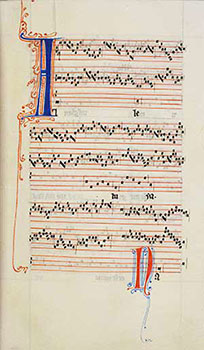|
|

Hear, kindly Creator, Our prayers and weepings
in this holy fast poured out these forty days.
From Lenten Hymn Audi Benigne Conditor
 We begin the liturgical season of Lent on Ash Wednesday. In many languages the name given to this sacred season expresses the number forty, such as Quadragesima in Latin. The English word Lent meaning "the Spring-fast" is derived from the ancient Anglo-Saxon words lencten, meaning "Spring," and lenctentid, which means not only "Springtide" but more specifically the month of March.
We begin the liturgical season of Lent on Ash Wednesday. In many languages the name given to this sacred season expresses the number forty, such as Quadragesima in Latin. The English word Lent meaning "the Spring-fast" is derived from the ancient Anglo-Saxon words lencten, meaning "Spring," and lenctentid, which means not only "Springtide" but more specifically the month of March.
The number 40 has tremendous significance in Judaism. The two Old Testament prophets who were permitted to approach God, Moses and Elijah, had to first prepare for forty days. During the Exodus from Egypt, the Hebrew people wandered for forty years in the desert before arriving in the Promised Land. On the First Sunday of Lent the Gospel of St. Mark recounts Jesus' forty day fast in the desert.
On the Observance of Lent
In his Holy Rule St. Benedict devotes Chapter 49 to the Observance of Lent:
The life of a monk ought at all times to be Lenten in its character; but since few have the strength for that, we therefore urge that in these days of Lent the brethren should lead lives of great purity, and should also in this sacred season expiate the negligences of other times. This will be worthily done if we refrain from all sin and apply ourselves to prayer with tears, to reading, to compunction of heart, and to abstinence. In these days, therefore, let us add something beyond the wonted measure of our service, such as private prayers and abstinence in food and drink. Let each one, over and above the measure prescribed for him, offer God something of his own free will in the joy of the Holy Spirit.
Prayer, Fasting, and Mercy
 The communal practice of observing a forty day fast before Easter is thought to date back to the apostles, according to accounts given by early church fathers. St. Athanasius (296-373 AD) in his Festal Letter XIX exhorted his congregation: "Anyone who neglects to observe the Forty Days Fast is not worthy to celebrate the Easter Festival." However, fasting alone is not enough. Saint Peter Chrysologus (380-450 AD) wrote eloquently of the inseparable link between Prayer, Fasting, and Almsgiving: The communal practice of observing a forty day fast before Easter is thought to date back to the apostles, according to accounts given by early church fathers. St. Athanasius (296-373 AD) in his Festal Letter XIX exhorted his congregation: "Anyone who neglects to observe the Forty Days Fast is not worthy to celebrate the Easter Festival." However, fasting alone is not enough. Saint Peter Chrysologus (380-450 AD) wrote eloquently of the inseparable link between Prayer, Fasting, and Almsgiving:
There are three things, my brethren, by which faith stands firm, devotion remains constant, and virtue endures. They are prayer, fasting and mercy. Prayer knocks at the door, fasting obtains, mercy receives. Prayer, mercy and fasting: these three are one, and they give life to each other.
Fasting is the soul of prayer, almsgiving is the lifeblood of fasting. Let no one try to separate them; they cannot be separated. If you have only one of them or not all together, you have nothing. So if you pray, fast; if you fast, show mercy; if you want your petition to be heard, hear the petition of others. If you do not close your ear to others you open God’s ear to yourself.
When you fast, see the fasting of others. If you want God to know that you are hungry, know that another is hungry. If you hope for mercy, show mercy. If you look for kindness, show kindness. If you want to receive, give. If you ask for yourself what you deny to others, your asking is a mockery.
“Fasting makes sense if it really chips away at our security
and,
as a consequence, benefits someone else.” —Pope Francis |
Burial of the Alleluia
 The Alleluia is "buried" at Vespers the day before Ash Wednesday. Alleluia, or hallelujah, is one of the few Hebrew words adopted by the Christian Church from apostolic times. It means "Praise the Lord!"
According to the regulation of Pope Alexander II (1073) the Alleluia is sung twice after the Benedicamus Domino at Vespers on the Tuesday before Ash Wednesday and not heard again until the Easter Vigil on Holy Saturday when we sing the three-fold Alleluia before the Gospel. The Alleluia is "buried" at Vespers the day before Ash Wednesday. Alleluia, or hallelujah, is one of the few Hebrew words adopted by the Christian Church from apostolic times. It means "Praise the Lord!"
According to the regulation of Pope Alexander II (1073) the Alleluia is sung twice after the Benedicamus Domino at Vespers on the Tuesday before Ash Wednesday and not heard again until the Easter Vigil on Holy Saturday when we sing the three-fold Alleluia before the Gospel.
Throughout the centuries there were many elaborate ceremonies for burying the Alleluia. In the fifteenth-century statute book of the church of Toul we find this description of a ceremony:
“On Saturday before Septuagesima Sunday all choir boys gather in the sacristy during the prayer of the None, to prepare for the burial of the Alleluia. After the last Benedicamus [i.e., at the end of the service] they march in procession, with crosses, tapers, holy water and censers; and they carry a coffin, as in a funeral. Thus, they proceed through the aisle, moaning and mourning, until they reach the cloister. There they bury the coffin; they sprinkle it with holy water and incense it; whereupon they return to the sacristy by the same way.”
For us today in monasteries it is a simple farewell. At Vespers on the Tuesday before Ash Wednesday, we close the Office with the singing of the Benedicamus Domino with the double Alleluia's. During Lent at the beginning of each Divine Office, in lieu of Alleluia, we sing: Laus Tibi Domine, Rex Eternae Gloriae, "Praise to you, Lord, eternal King of Glory.""
His Wings Will Overshadow You
 During Lent the texts we sing at Mass and during the Hours on the First Sunday of Lent are taken from psalm 90 which we sing at the Office of Compline every night. Compline is the last office we sing at the end of the day, before we go to sleep and it contains a plea for a peaceful night and protection against Evil. At Vespers the Brief Responsory, Versicle, and Response are also from this beautiful psalm: During Lent the texts we sing at Mass and during the Hours on the First Sunday of Lent are taken from psalm 90 which we sing at the Office of Compline every night. Compline is the last office we sing at the end of the day, before we go to sleep and it contains a plea for a peaceful night and protection against Evil. At Vespers the Brief Responsory, Versicle, and Response are also from this beautiful psalm:
R. br. Scapulis suis obumbrabit tibi. (He will overshadow you with His pinions.)
Et sub pennis sperabis. (And under His wings you will hope.)
V: Angelus suis Deus mandavit de te. (God has given His angels charge over you.)
R: Ut custodian te in omnibus viis suis. (To guard you in all your ways.)
Lenten Hymns for Vespers and Lauds
We are pleased to offer you original translations by Joseph T. Moller of the hymns that we sing throughout Lent. The hymn Audi Benigne Conditor was composed by Pope St. Gregory the Great (540-604) and is sung at the Office of Vespers. Acknowledging our human frailty, it is a plea for God's forgiveness: "Scrutinize and nourish our hearts, the weakness of men you know, to those returning to you show
forgiveness and grace."
The hymn from Lauds, Iam Christe Sol Iustitiae, probably composed in the 10th Century, is full of hope and a promise of resurrection, that in the day of Christ, all things will "re-flower". The hymn is sung as the sun is rising, so we are asking Christ, the Sun of Justice:"From our minds scatter all shadows, that virtue’s light return, as to the earth You restore the day." The hymn's Gregorian Chant melody and rhythm beautifully express Lenten joy and hope.
| Audi Benigne Conditor
|
| Lenten Season Vespers Hymn
|
Audi Benigne Conditor,
nostras preces cum fletibus,
sacrata in abstinentia
fusas quadragenaria.
|
Hear, kindly Creator,
Our prayers and weepings
In this holy fast
Poured out these forty days.
|
Scrutator alme cordium,
infirma tu scis virium;
ad te reversis exhibe
remissionis gratiam.
|
Scrutinize and nourish our hearts,
The weakness of men you know.
To those returning to you show
Forgiveness and grace.
|
Multum quidem peccavimus,
sed parce confitentibus,
tuique laude nominis
confer medelam languidis.
|
Much indeed have we sinned
But spare us as we confess.
For the praise of your name
Bring healing to the languishing.
|
Sic corpus extra conteri
dona per abstinentiam,
ieiunet ut mens sobria
a labe prorsus criminum.
|
Thus the body without be worn down.
Grant through abstinence
That in fasting the mind within be sober
Far from the falling of sin.
|
Praesta, beata Trinitas,
concede, simplex Unitas,
ut fructuosa sint tuis
haec parcitatis munera.
Amen.
|
Grant, blessed Trinity,
Deign, most simple Unity,
That fruitful be
The gifts of our fast.
Amen.
|
| Iam Christe Sol Iustitiae
|
| Lenten Season Lauds Hymn
|
Iam Christe Sol Iustitiae
mentis dehiscant tenebrae,
virtutum ut lux redeat,
terris diem cum reparas.
|
Now, Christ, Sun of Justice,
From our minds scatter all shadows
That virtue’s light return
As to the earth You restore the day.
|
Dans tempus acceptabile
et paenitens cor tribue,
convertat ut benignitas
quos longa suffert pietas.
|
Granting us an acceptable time,
A penitent heart bestow
That kindness convert
Those whom Your long suffering goodness endured.
|
Quiddamque paenitentiae
da ferre, quo fit demptio,
maiore tuo munere,
culparum quamvis grandium.
|
And some penance
Grant us to bear, however severe,
That by Your greater grace
Sins may be taken away.
|
Dies venit, dies tua,
per quam reflorent omnia;
laetemur in hac ut tuae
per hanc reducti gratiae.
|
The day comes, Your day,
On which all things will re-flower.
Let us rejoice being led back
Through it and on it to your grace.
|
Te rerum universitas,
clemens, adoret, Trinitas,
et nos novi per veniam
novum canamus canticum.
Amen.
|
You, may the universe of all things,
Adore, merciful Trinity.
And may we renewed by your favor
A new song sing.
Amen.
|
(Translations of the hymns Audi Benigne Conditor and Iam Christe Sol Iustitiae courtesy of Joseph T. Moller: Copyright © 2018 The Abbey of Regina Laudis. All rights reserved.)
|



 We begin the liturgical season of Lent on Ash Wednesday. In many languages the name given to this sacred season expresses the number forty, such as Quadragesima in Latin. The English word Lent meaning "the Spring-fast" is derived from the ancient Anglo-Saxon words lencten, meaning "Spring," and lenctentid, which means not only "Springtide" but more specifically the month of March.
We begin the liturgical season of Lent on Ash Wednesday. In many languages the name given to this sacred season expresses the number forty, such as Quadragesima in Latin. The English word Lent meaning "the Spring-fast" is derived from the ancient Anglo-Saxon words lencten, meaning "Spring," and lenctentid, which means not only "Springtide" but more specifically the month of March.